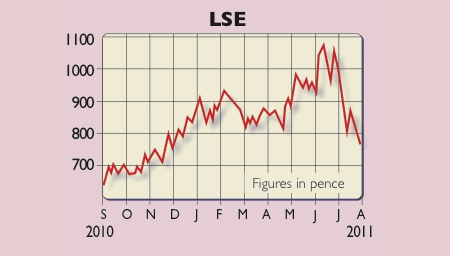
With extreme levels of volatility triggered by the struggling US economy and a possible European banking crisis, spooked investors would be forgiven for shutting up shop. This would be a mistake. The mini crash has left many under-loved stocks on attractive valuations and paying decent dividend yields. Take the London Stock Exchange (LSE), a 210-year-old institution and one of Britain’s most sought-after trophy assets.
Its exchange platform recorded the third-highest number of deals ever on 9 August. Only on two previous occasions have volumes been greater. Those were immediately after Lehman Brothers collapsed in September 2008, and three days later when AIG was bailed out. To me, this counter-cyclical trait makes a joke of the recent 15% decline in the share price. In a world dominated by ‘high frequency trading’ and ‘dark pools’, there is a concern that the LSE could be a bit of a dinosaur – vulnerable to new kids on the block such as alternative stock exchange Chi-X. But the statistics indicate otherwise. The LSE still commands a dominant 64% share of the equity market and is Europe’s biggest player.
Another issue that seems to have been blown out of all proportion is the fear that the German chancellor Angela Merkel and French president Nicolas Sarkozy will introduce a new financial transaction tax. I accept that this might hit volumes, but I can’t see such an unpopular idea being adopted in London. After all, a similar proposal was flatly rejected by the European Union in 2010.
London Stcok Exchange (LSE: LSE), rated an ADD by Alphaville
So how is the LSE faring? In July the board announced it had enjoyed a strong start to the year, with the City forecasting revenues and underlying earnings per share (EPS) of £700m and 80.7p respectively for the period ending March 2012. That puts the company on an undemanding 11.4 times earnings while offering a none too stingy 2.9% dividend yield. But this is only part of the story. It’s only a matter of time before the LSE is taken over. In June it was unceremoniously jilted in its £2.3bn marriage with the Toronto bourse. This leaves it as one of the industry’s few crown jewels left up for grabs against a backdrop of sector consolidation. In 2007, rival Nasdaq tabled a £12.43 per share bid that they said shareholders should accept for “certainty”. The board was made of stronger stuff. Moreover, some of the sovereign-wealth funds that sit on the LSE’s register bought in at rich levels, and I suspect it would take a knock-out offer before they rubber-stamped any future approach.
Given all this, I rate the group on a ten times earnings before interest, tax and amortisation (EBITA) multiple. After deducting the £245m of net debt, that produces an intrinsic worth of over £12 a share. Of course, nothing is risk free. The LSE is exposed to a cooling in initial public offerings and other capital-raisings if the economic turmoil continues. Additionally, revenues from its data services division are sensitive to City job cuts, and regulatory changes, such as more short-selling bans, could also impact performance. But given the enormous opportunity to capture a big slice of the over-the-counter derivatives market, the LSE gets a thumbs up. AlphaValue has a price target of £10.52. The next trading statement is scheduled for 29 September.
Rating: BUY at £9.20
• Paul Hill also writes a weekly share-tipping newsletter, Precision Guided Investments. See www.moneyweek.com/PGI or phone 020-7633 3634 for more.